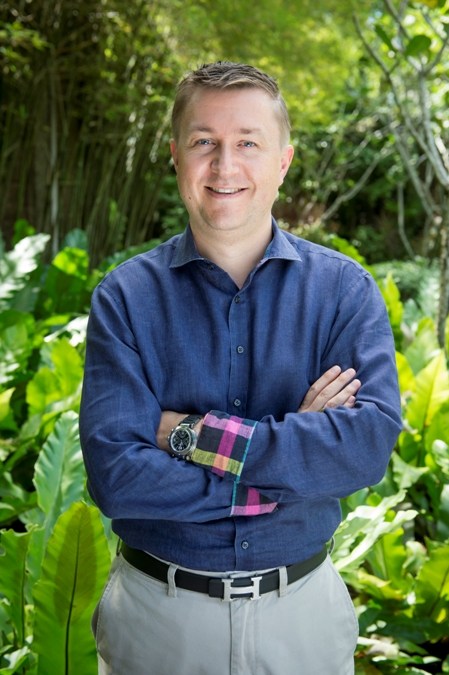In the hospitality industry, hotels jostle to differentiate by providing a personalized customer experience – from playing the right in-room welcome music and furnishing special-request linens to serving a guests’ preferred espresso at breakfast.
Behind-the-scenes, that means nurturing team spirit to “push in the same direction” says Giles David Selves, General Manager of Keraton at The Plaza in Central Jakarta. Refuting the idea of the executive team as an “extension” of the manager, Selves handpicks tell-it-like-it-is team players who hold themselves personally accountable.

“If they don’t like something they’ll tell me – which is good, I think," he says. "It’s healthy that the leader is questioned and challenged; I think it keeps everybody honest."
Being upfront about it
The business of serving people is fraught with variables: customers and employees have bad days and mustering sincere warmth and hospitality can be taxing when, for instance, a staff member has problems at home – an inherent risk of labor-intensive industries where quality control is less straight-and-narrow.
“One of the things that I think is a bit of a misnomer about the luxury hospitality sector is that it’s always right,” says Selves, whom, in his previous post, managed the pre-opening team of the St. Regis in Bangkok. “If we’re honest, it’s not always right. We get it right 98-99 percent of the time, but everybody’s human.”
The 38 year-old Briton maintains that admitting to a mistake is precedent to proposing a solution. “I encourage all of the team: ‘If we get it wrong, tell them we got it wrong, apologize and explain how you’re going to fix it.’ And most people understand that. When you try and cover it up, hide it, that’s when the problems start to come.” Ultimately, guests may feel more valued in light of efforts taken to rectify a mishap, says Selves – resulting in customer loyalty and the Keraton’s impressive repeat guest rate of over 50 percent.
Building and managing a “village”
Selves relishes the exertion of leading a pre-opening team at ground zero versus assuming the reins at a fully-operating establishment. “I enjoy that part of the creation, the setting it up, putting the guidance and direction in place, developing the people to deliver the experience.”
In 2010, he headed a 600-strong operational team through the pre-opening phase of The Romanos and The Westin Resort in Costa Navarino, Greece. One of Europe’s largest integrated resorts, its premises comprise 766 rooms, 15 restaurants and bars, over 150 swimming pools, 5000 square meters of meeting space, an amphitheatre, shopping village, aqua park and more.
“It was like opening a village,” recalls Selves, who previously spent 11 years in Food & Beverage.
He was in charge of whipping into shape everything from construction and the engineering team to implementation of butler and housekeeping services; from “understanding the vision that the owner has and that Starwood [Hotels and Resorts] has from a brand perspective,” to logistics such as “how do you find the people, where do you buy everything that you need to buy?”
Under Selves’ leadership, the gargantuan property became one of the most eco-friendly in Europe. Not all of this strategy is replicable at Keraton in Jakarta, he concedes, partly because of a divergent business model.
Efforts to recycle paper, plastic, glass and tin cans notwithstanding, the “traceability” of the refuse after it leaves the building is dubious as garbage reuse has yet to be mainstreamed in Jakarta. However, Selves proposes replacing single-use batteries with rechargeable ones to operate TV remotes and door locks on all of the rooms to minimize waste disposal.
“As a multinational hotel operator I think we need to set the example for others to follow in terms of how we behave," he says. "Also, we are lucky that we have access to resources and information that others don’t because of our global scale,” he says.
Culture of Openness
Contacting the higher-ups in an organization usually entails sweet-talking a draconian gatekeeper. However, Selves proudly displays his cellphone number on the homepage of the Keraton's official website, where all and sundry can hit him on Whatsapp or BlackBerry Messenger.
A general manager’s attention is undoubtedly divided, but Selves disagrees with general concern about “bothering” the manager. “It sends a message, I think, to my team about how I want to approach the guests from being contactable, being available, being focused on being there for them," he explains. "But also, I’m sending a message to the customer that says: ‘We’re here for you’.”
While room reservations are booked by an assistant and special requests are handled by the chief butler, Selves enjoys being “the conduit from a communications perspective” even if such openness means receiving phone calls at odd hours. Furthermore, the transparency attracts organic feedback, an indispensable source of learning for any business, more so than questionnaires and hotel review forums.
"One of the things that I encourage all of the team is: ‘Never accept that today was good enough’,” says Selves.
According to hotelier’s code, no guest request – within legality – is too outlandish, even the likes of which inspired journalist Imogen Edwards-Jones’ tell-all book Hotel Babylon, such as $9,000 bottles of wine, bathtubs of Evian and even dead sheep in the room.
“I think it’s important that you go into it with an attitude that says: ‘I’m being asked to deliver something; how do I do it?’ And as long as you approach it in that manner, I think that 99 percent of the guest’s requests, as long as they’re not illegal, are deliverable,” explains Selves. “So to me, having been in the luxury industry for 17-18 years, I think that abnormal is the normal, if that makes sense.”
Selves applies the same people-centric philosophies of hospitality to his leadership style: “Being approachable and being there for your people is a big part,” he says, adding that a leader’s job is to “believe that their people are the most important thing and look after them and give them what they need to deliver what they need to deliver.”

